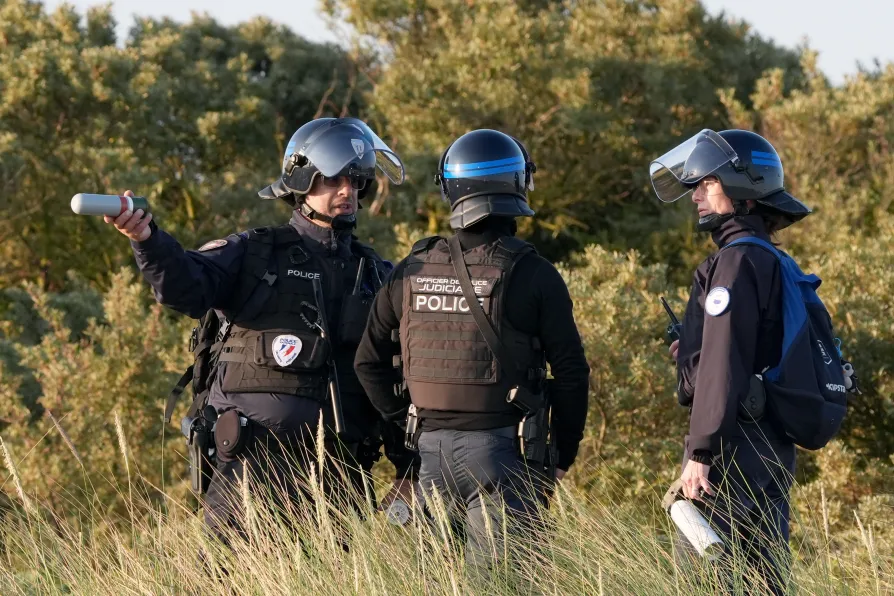Labour slammed for 'one in, one out' migrant return deal with France

 French authorities seen on a beach in Gravelines, France, as they prepare to fire tear gas at a group of people thought to be migrants, June 17, 2025
French authorities seen on a beach in Gravelines, France, as they prepare to fire tear gas at a group of people thought to be migrants, June 17, 2025
LABOUR was slammed for “trading in human lives” as the government’s “one in, one out” Channel migrants returns deal with France came into force today.
Refugee campaign groups said ministers were proving to be “just as unprincipled and impractical” as the Tories by “swapping one unworkable gimmick for another.”
The pilot agreement, announced during French premier Emmanuel Macron’s state visit last month, will see some people who have crossed the Channel sent back to France in exchange for taking some asylum-seekers with ties to Britain.
Asylum Matters executive director Louise Calvey said: “It’s a grubby trade in human lives that will do nothing more than remove people from this country back into the hands of people smugglers.
“We don’t need another convoluted, Rwanda-style gimmick that forces some people to risk their lives while a select few are deemed worthy of protection.
“It’s yet another example of our government refusing to adopt the only policy that will save lives: safe and accessible routes for all who need them.”
Home Secretary Yvette Cooper last July described the Tories’ failed £700 million Rwanda scheme as the “most shocking waste of taxpayers’ money I have ever seen” after it managed to send only four people to the east African country.
But she admitted today that her government’s scheme wouldn’t stop the dangerous crossings on its own, insisting instead that it was about the “principle” rather than the number of migrants returned.
Telling broadcasters that migrant detention for the swap will begin tomorrow, she said: “We never claimed that there is a single silver bullet on this.”
She claimed that putting a number on the quantity of migrants set to be returned to France could aid criminal gangs, adding: “I think this is the right principle that we should be pursuing, that people who are arriving on small boats should, frankly, be returned to France.
“They’re coming on illegal boats, they’re paying thousands of pounds to people smugglers. That money should be lost, and they should be returned.
“Where we take people from other countries, we should do so through a legal process, where people have gone through security checks,” she said.
Amnesty International UK’s Refugee and Migrant Rights director Steve Valdez-Symonds said: “When it comes to asylum policy, this government is proving to be just as unprincipled and impractical as its predecessor.
“A returns deal with France that makes access to safety in the UK — even for those with close family or connections here — dependent on someone else risking their life to cross the Channel only cements the role of smugglers in how people fleeing war and persecution must seek asylum in the UK.
“Once again, refugees are treated like parcels, not people, while the public is left to pay the price for yet another cruel, costly failure dressed up as policy.”
He added that instead of facing its duty to provide asylum, the government “continues to swap one unworkable gimmick for another — aligning itself with the smugglers and the chaos they exploit.”
Care4Calais CEO Steve Smith said that any asylum claim is individual and “that’s why, in a compassionate and humane society, we wouldn’t have two governments trading human lives like some import and export deal — we would have proper safe routes that are open for people fleeing war, torture and persecution to claim asylum.
“It’s a damning indictment of our politics that we don’t have these safe routes, but instead have these grubby deals.”
Some 25,436 people have already made the journey this year, according to Home Office figures — 49 per cent higher than at the same point in 2024.
It has been reported that about 50 a week could be sent to France — a stark contrast to the more than 800 people every week who on average have arrived in Britain via small boat this year.
The initial agreement will be in place until June 2026 and the government has said that it will resume processing of all asylum claims, including individuals who arrived in Britain illegally.
The Refugee Council’s director of external affairs Imran Hussain said: “This treaty marks a serious step to disrupt the business model of the gangs. It is not an obviously unworkable policy like Rwanda but nor is it a silver bullet.
“There are genuine questions for the government about how this deal will work and whether it will treat people fairly, legally and with dignity.
Freedom from Torture’s associate director of advocacy Natasha Tsangarides said that while the pilot offers a pathway to sanctuary for a small number of refugees, it will rely "on the mass detention of survivors of torture and persecution.
“We know from our therapy rooms how profoundly harmful any time in detention is for people who’ve been through the unimaginable horrors of torture,” she warned.













